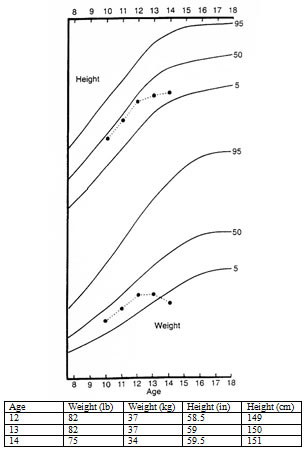Summary
Definition
History and exam
Key diagnostic factors
- presence of risk factors
- significantly low body weight
- fear of gaining weight or becoming fat, or behaviours that interfere with weight gain despite evidence of significantly low body weight
- disturbed body image
- calorie restriction
- binge-eating and/or purging
- misuse of laxatives, diuretics, or diet pills
- amenorrhoea
- decreased subcutaneous fat
Other diagnostic factors
- general fatigue, weakness, and poor concentration
- significant preoccupation with thoughts of food
- orthostatic hypotension
- non-specific gastrointestinal symptoms
- cardiac symptoms and signs
- changes to hair, skin, and nails
- dependent oedema
- osteopenia or osteoporosis
Risk factors
- female sex
- adolescence and puberty
- obsessive and perfectionist traits
- exposure to Western media
- genetic influence
- middle and upper socio-economic classes
- athlete
- appearance-related teasing
- childhood maltreatment
- coeliac disease
- type 1 diabetes mellitus
Diagnostic investigations
1st investigations to order
- clinical diagnosis
- FBC
- serum chemistry
- thyroid function tests
- liver function tests
- blood glucose
- urinalysis
Investigations to consider
- Sick, Control, One, Fat, and Food (SCOFF) questionnaire
- ECG
- bone densitometry (dual-energy x-ray absorptiometry)
- estradiol in females
- testosterone in males
- urine or serum pregnancy test
Treatment algorithm
Contributors
Authors
Evelyn Attia, MD
Professor of Psychiatry
Columbia University and Weill Cornell Medical College
New York
NY
Disclosures
EA receives royalties from UpToDate and Oxford University Press for authorship and has served as a clinical advisor to Equip Health, Inc.
B. Timothy Walsh, MD
Professor of Psychiatry
Columbia University
New York
NY
Disclosures
BTW has received royalties and honoraria for writing, editing, speaking, or consulting from Guilford Publications, McGraw-Hill, Oxford University Press, UpToDate, Wiley, the University of British Columbia, Silverhill Hospital, the University of Alabama, the American Society for Clinical Psychopharmacology, Health Advances, and Dell Medical School.
Acknowledgements
Professor Evelyn Attia and Professor B. Timothy Walsh would like to gratefully acknowledge Dr Pauline S. Powers and Dr Abby M. Irwin, previous contributors to this topic.
Disclosures
PSP and AMI declare that they have no competing interests.
Peer reviewers
Heather Thompson-Brenner, MD
Director
Eating Disorders Program Center for Anxiety and Related Disorders
Psychology Department
Boston University
Boston
MA
Disclosures
HTB declares that she has no competing interests.
Use of this content is subject to our disclaimer
